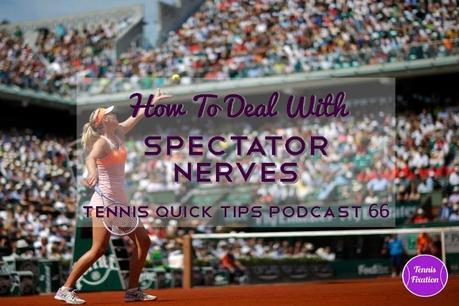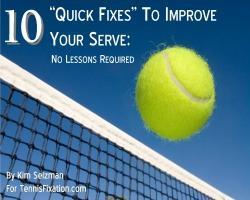Podcast: Play in new window | Download
This week, I'm answering the question of a college tennis player who suffers from something I'll bet we've all experienced - spectator nerves. The more she thinks about who's watching her play and how well she needs to play, the more she messes up and plays badly. So we're going to talk about the mental game here and I'll give you my best tips for putting aside those spectator nerves and playing mentally strong tennis. You can listen to this episode by clicking on the media player above or by listening in with your favorite podcast app. You can also subscribe in iTunes by clicking on this link: tennisfixation.com/itunes.

SHOW NOTES:
If you've been playing tennis for more than just a few days, then you know, tennis is as much a mental game as it is a physical game. And sometimes the mental part of it can be downright debilitating. I recently received an email from Mariana, a college tennis player, asking for some advice. Mariana wrote this:
I play in college right now, but I'm having so much trouble mentally. All the coaches or teammates watching me make me nervous and all I want is to impress them. I can't focus on my game and I can't definitely play nearly as much as I know what I am able to play. I get so nervous I hit the ball on the frame at least once a game. Last season I was a little bit better about it, now I shrink so much during matches. Can you give me any advice for this? Thank you so much!
Mariana, I have so been there. As I'm sure most Tennis Quick Tips listeners have been. While we may not all have a tennis coach that we're worried about, we have team captains, or partners, or opponents, or just people we vaguely know, sitting on the sidelines, watching us play tennis, judging every move we make. At least if feels that way.
I myself have had this feeling and know how negatively it can impact your game. To deal with this, you need just a few mental strategy tips that can help you recognize and move past your spectator nerves. So here are my best tips to apply in this situation:
1. Be aware of what's happening.
This is the first step for getting a handle on this or any mental problem you're experiencing on court. You need to be aware of what you're thinking, what you're experiencing, what you're feeling out there. We often rush through points, especially when things are going wrong and we're worried about what others are thinking of our performance. But by pausing in what we're doing, recognizing the feelings of worry and anxiousness that we're having, we can start the process of calming ourselves and focusing on what's truly important.
2. Play in a "bubble."
What does that mean? It means that you absolutely must focus on on what's happening on your court and on nothing else. You need to play as if you're inside of a bubble that prevents you from even seeing what's happening outside. Because the fact is, there are lots of things happening on your court and any one of them might be something you need to be thinking about. You might need to think about what you're doing on court, how you're moving, how you're swinging your racquet. You may need to think about what your opponent is doing. You may need to think about how the wind is affecting the ball. Or how to deal with the sun in your eyes. Maybe you need to think about what type of spin to put on the ball or how hard or soft to hit the ball. Any of these is important and will actually impact your match. But the minute you take your focus away from what's happening on your court, the minute you go outside the bubble, you're distracting yourself and wasting mental energy on something that will not impact your match. So keep your focus on your court and play in your bubble.
3. Play for yourself.
My final tip is to play for yourself. Yes, this is easy for me to say. Unlike Mariana, I am not a college tennis player. I never had an athletic scholarship where my performance impacted me financially. And, knowing what little I do know of scholarships, I get that Mariana's on-court performance may determine whether she gets to stay on the team and even gets to stay at her school. But if you're playing to make a good impression on your college coach, or your tennis team captain, or your partner, or even some random person sitting on the sidelines of your match, then you're setting yourself up to play poorly. In his book, The Best Tennis of Your Life: 50 Mental Strategies for Fearless Performance, author and sports psychologist Jeff Greenwald has this to say about playing for yourself:
It's easy to get caught up in the trap of wanting to please other people with your performance and results . . . rather than playing for yourself. Let's be honest: It feels good to have others validate you and be impressed with your game. There's just one problem with this. You can get addicted to the praise, and it eventually starts to influence your thoughts and ultimately how you play, because you put too much pressure on yourself to win. Instead of focusing on your game plan, you then have to deal with thoughts about letting others down or losing the praise you used to enjoy. When this need gets too intense, you game can begin to falter.
The only way to avoid this trap of trying to please others, is to play for yourself. That means playing up to the level that you know you are capable of. Play your own best tennis. You know when you do and you know when you don't. Now, your best tennis will not always be winning tennis. Even Roger Federer knows that. But if you play the best tennis you know you can play, then you're playing for yourself. And that's always good tennis.
So, to review, when dealing with spectator nerves, you need to (1) be aware of what's happening, (2) play in your own tennis "bubble," and (3) play for yourself.
Before I close, I do want to say this to Mariana. Here's the one thing I do know Mariana - clearly, your coach saw some great potential in you, enough potential that he or she was willing to invest some scholarship dollars in you. So the best thing you can do is continuing playing up to that potential. Yes, being on a collegiate tennis team means you'll learn new things that you'll have to incorporate into your game. But you must be a hard worker with the skills and talent to keep your spot on the team. So keep working at it. Be a "coachable" player and I'm sure you'll retain your spot on the team, regardless of whether you win every match.
RESOURCES AND LINKS FROM THIS EPISODE:
SHARE THIS EPISODE:
If you enjoyed this episode, or know someone who might, please feel free to share it with them. You can simply direct people to:
There are also sharing and email buttons at the bottom of this post.
PLEASE SUBSCRIBE AND REVIEW:
Be sure and subscribe to Tennis Quick Tips so you never miss an episode:
I hope you'll consider leaving your review and rating on iTunes by clicking here. It will help the show become more easily discovered by like-minded, awesome people just like you. I really appreciate it!
Thanks so much for listening and, as always, Happy Tennis!

© Kim Selzman 2014 All Rights Reserved
Full disclosure - Some of the links in this post are Amazon affiliate links. I make a very small commission if you purchase any item using my Amazon affiliate links. Your cost is the same for these items whether or not you use these links. This does not influence my opinion of these items and I always tell the absolute truth about every item that I review. I usually do not review items that I don't like.
If you enjoyed this article . . .



